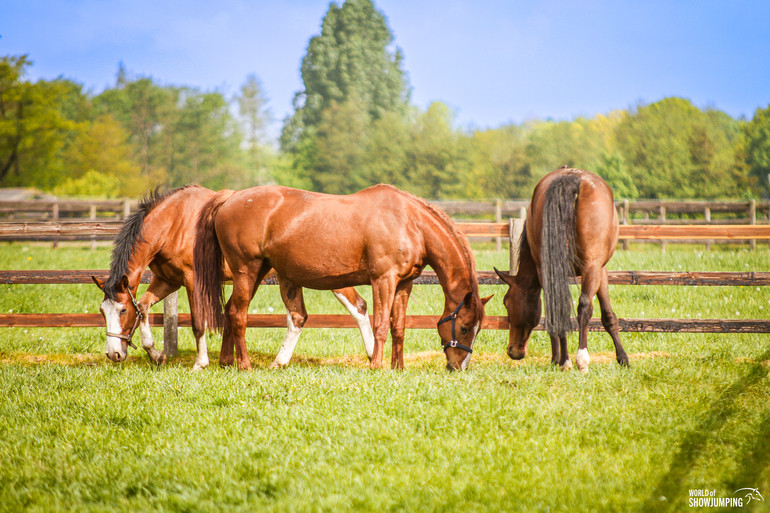Text © World of Showjumping
“Systematically deworming horses is the old way of doing things,” Dr. Emmanuelle Van Erck Westergren – a European specialist in equine internal medicine at Equine Sports Medicine Practice in Waterloo, Belgium – tells WoSJ. “It is an obsolete and dangerous approach.”
While many might be familiar with the issue of growing antibiotic resistance, there is a similar concern when it comes to anthelmintic medication used to deworm horses. “The more you're going to expose living organisms like bacteria or worms to medication, the more likely they are to develop resistance over time,” Van Erck Westergren explains. “Living organisms can mutate, adapt and become resistant to these treatments. While resistance to antibiotics has been an issue for a long time, we've seen a progressive shift with worms as well. This shift is a result of the overuse of deworming products.”
It's becoming more and more challenging to eradicate worms
“There are a few different classes of anthelmintic drugs,” Van Erck Westergren continues. “The most commonly used include substances such as fenbendazole, praziquantel, ivermectin and moxidectin – the last being the most potent. However, you should keep them as a last resort. If you overuse them, they will become progressively inefficient and in time we will be left with nothing to deworm with.”
“In the past, people have kept on with a protocol of two to four times of deworming per year without knowing if there actually was a need to deworm in the first place. This has caused some of the worms present inside the horse to be in regular contact with some of the anthelmintic drugs, which has created resistances. It's becoming more and more challenging to eradicate worms.”
Test before treating
Instead of blindly deworming horses, awareness should be created around the fact that there are ways of testing for presence of worms. “You can collect faeces from your horse over several days and then send it to a specialised lab where they will look for eggs,” Van Erck Westergren explains. “Based on the results, you can decide to use a specific substance depending on the parasites that were found. If you think that testing each horse is expensive, you can always put faeces of several horses inside the same bag. This will give you an idea of the overall contamination of your herd.”
It's always a good idea to test first
As in so many other areas of management, horses require individual consideration when it comes to scheduling deworming. “Some horses don't require worming for a whole year, while others require treatment each time there's a change in season,” Van Erck Westergren continues to explain. “It's going to depend on the living conditions they're in, mainly if they are going outdoors or not. If they're going outdoors with other horses, how many horses are within the same space? When you increase the number of horses on a small surface, you increase the risk of contamination.”
The first step in fighting off worms is reducing exposure to them in the horses’ environment, Van Erck Westergren points out. “It's been proven that collecting the horses’ faeces and cleaning the paddocks reduces the remnants of eggs, which reduces exposure,” she says.
Why treat a healthy horse?
It is fairly simple to detect a horse that suffers from worms. “Signs of parasites would be horses that have a poor coat, that are difficult to maintain in good physical condition and that might be rubbing their tail,” Van Erck Westergren details. “These symptoms should incite you to look for worms in the faeces. There are also blood tests that allow you to look for more specific worms, or antibodies against certain specific species. If you have a horse that looks like he could be hosting parasites but you can't find any in the faeces, it might be a good idea to run a blood test. It's always a good idea to test first. And if you are going to deworm horses, you should avoid putting them in a paddock or a field for two to three days following the medication. After receiving an anthelmintic drug, horses are more likely to shed eggs, which can contaminate the environment and put other horses at risk.”
In order to reduce the phenomenon of resistance, we need to think and act responsibly
“However, if you've got a healthy looking, well performing horse with a good coat that consistently maintains weight, eats and performs well, why would you blindly deworm?” Van Erck Westergren concludes. “Right now, it's completely counterproductive – and actually very dangerous – to systematically deworm. This type of thinking has caused the resistances that have developed in the last years. In order to reduce the phenomenon of resistance, we need to think and act responsibly: Not worm systematically and instead worm according to what is actually present in the current population of horses. Otherwise we will face parasitic infestations that we can no longer control and leave horses helpless.”
*Dr Emmanuelle Van Erck Westergren is the president of the Belgian Equine Practitioner Society (BEPS). She graduated from the Ecole Nationale Vétérinaire de Maison Alfort (France) and did a PhD on respiratory functional tests in horses at the University of Liege (Belgium). She is a diplomate of the European College of Equine Internal Medicine (ECEIM) and of the European College of Equine Sports Medicine. Emmanuelle founded her specialized referral practice, the Equine Sports Medicine Practice based in Belgium and consults internationally.
11.4.2024 No reproduction of any of the content in this article will be accepted without a written permission, all rights reserved © World of Showjumping.com. If copyright violations occur, a penalty fee will apply.










